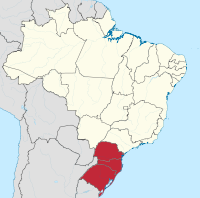
Photo from wikipedia
Part of the energy consumed in the world comes from limited sources, which eventually are expected to be depleted. The search for alternative sources to meet energy needs is crucial.… Click to show full abstract
Part of the energy consumed in the world comes from limited sources, which eventually are expected to be depleted. The search for alternative sources to meet energy needs is crucial. Biodiesel derived from vegetable oils and animal fats stands out as a biodegradable and renewable alternative source of energy. Sunflower is among the top four oil crops produced worldwide, and Brazil has a high production potential for this crop. This study aimed to identify the sunflower genotypes with the highest potential for biodiesel production in the Pre-amazon region of Brazil, where the advance of agricultural frontier represents an important role on biodiesel production. This study was conducted over 2 years of observations. The following genotypes were used: M734 (T), Helio358, EMBRAPA 122, and BRS G 35. The following parameters were assessed: initial flowering date (IFD), physiological maturity date (PMD), plant height (PH), grain yield (YIELD), thousand achene weight (TAW), and oil content (%OC). The climatic conditions of each experimental period were distinctive and directly affected the results obtained. The genotype Embrapa 122 showed the best performance regarding yield and was recommended for the pre-Amazon region of Brazil as the best adapted genotype to the local environmental conditions.
Journal Title: Journal of Agricultural Science
Year Published: 2019
Link to full text (if available)
Share on Social Media: Sign Up to like & get
recommendations!